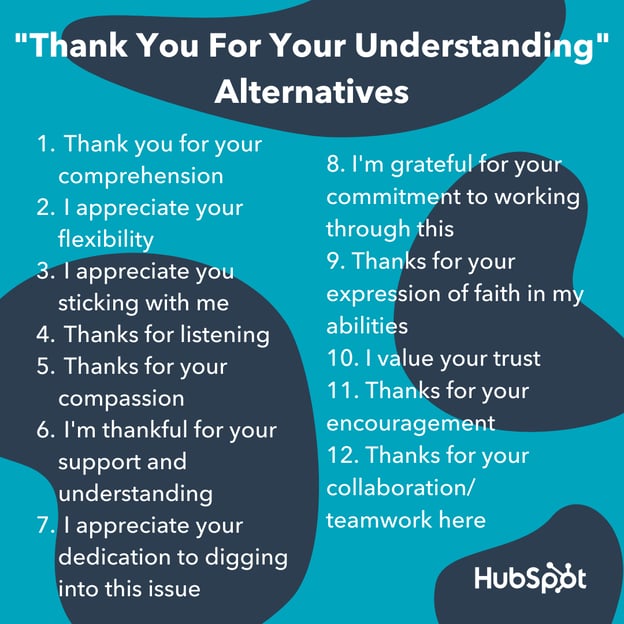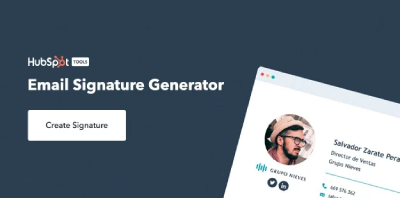Thanks for Given Me an Excuse to Play Again
"Thank you for understanding" automatically makes me think I'm being let down. Someone could hand me an ice cream cone and say, "Thanks for understanding," and I'd likely stand there waiting for the boom to be lowered while my cone sadly melted. Often, this phrase isn't a bad omen at all — it's simply one that's overused and misunderstood. If you're in sales, it's important to be a student of language to ensure your communication is never weighed down by a poor turn of phrase or easy platitude. So, instead of reaching for your trusty "Thanks for understanding," here are a few alternatives — along with when and how you'd use them. This is actually a helpful phrase when communicating with English speakers for whom English is not their primary language. "Thank you for your comprehension" translates in a cleaner, more coherent way for many non-native English speakers. Example: "I've attached the documents for your review at the bottom of this email. Thank you for your comprehension." Many times, when we thank someone for understanding, we're really thanking them for allowing us to extend a deadline, forgiving us for moving a meeting, or explaining why we need to stick with a certain timeline. In these cases, "Thanks for your flexibility" better communicates what you're really appreciative of. Example: "I appreciate your flexibility in allowing me to move our meeting to tomorrow." You might also use this phrase to thank someone for bearing with you through a long presentation or meaty email thread. Instead of thanking them for understanding how complicated the issue is, thank them for sticking with you. Example: "Thanks for sticking with me while our lawyers firmed up the details of our contract." How do we understand? By listening. If someone understands why you've made a certain decision or taken a specific action, they've likely listened to what you have to say. And that's worth acknowledging. Example: "That was a long presentation. I hope you found it valuable and know that I really appreciate you listening." Did you make a mistake and forget to attach a conference number to your most recent meeting invite? Everyone makes mistakes, but when you send an apology email make sure to acknowledge their compassion for your blip of humanity. Example: "I apologize once more for the technical issues on our call today. We're working to get those sorted out, and I'd like to thank you for your compassion on this issue." Understanding doesn't always equal support — but in some scenarios, it can. If a prospect goes to bat for you in a meeting with their team or superiors, thank them for understanding your product or service's value. Example: "There was some doubt in that meeting, but I really appreciated your support for what we do." Sometimes understanding requires both parties to spend more time and resources digging into an issue. In these cases, it's best to acknowledge their extra work. Example: "Thanks for getting your hands dirty and digging into this issue with me. I think it will benefit our project moving forward." It takes time to work through certain issues. And if a client or prospect demonstrates the patience and fortitude to solve challenges with you, don't just thank them for understanding — thank them for committing to seeing things through. Example: "I know it wasn't easy working with your HR team to get that hiring data, and I know we're not quite to the finish line, but I wanted to thank you for your commitment to working through this with me." When a client or prospect takes the time to work through a difficulty, that's a sign they're committed to your product/service — or your abilities as a salesperson. When they put their faith in you, make sure it doesn't go unnoticed. Example: "Thank you for supporting me in that meeting with your executive staff. I appreciate your faith in my abilities." Similarly, when a prospect arranges for you to give a presentation in front of their peers or executives, it means they trust you enough to give you that opportunity. Example: "I appreciate the opportunity to speak to your colleagues about [Company name] and what we offer. I value your trust and will work hard to meet and — hopefully — exceed your expectations." When mistakes are made, a great client or prospect might tell you they understand. Instead of mirroring their language, thank them for their encouragement. Because it is encouraging to have support when you know you've let them down. Example: "I really dropped the ball when I forgot to invite your technical director to our meeting last week and wanted you to know how much your encouragement meant to me." Sometimes you'll develop a collaborative relationship with your prospects/client. In these cases, they're really going the extra mile and deserve to be recognized. Example: "I know this project required a lot of your time, and I couldn't have done it without you. Thank you for your collaboration." Truly great business professionals are students of language and always looking for new ways to tweak and test their communication. We hope you'll try a few of these phrases out on your prospects and see how they humanize your emails. Editor's note: This post was originally published in August 2018 and has been updated for comprehensiveness. 

Better Ways to Say, "Thank You for Understanding"
1. Thanks for your comprehension.
2. I appreciate your flexibility.
3. I appreciate you sticking with me.
4. Thanks for listening.
5. Thanks for your compassion.
6. I'm thankful for your support and understanding.
7. I appreciate your dedication to digging into this issue.
8. I'm grateful for your commitment to working through this.
9. Thanks for your expression of faith in my abilities.
10. I value your trust.
11. Thanks for your encouragement.
12. Thanks for your collaboration/teamwork here.
Show Appreciation the Right Way


Originally published Jul 30, 2021 5:00:00 PM, updated July 30 2021
Source: https://blog.hubspot.com/sales/thank-you-for-your-understanding